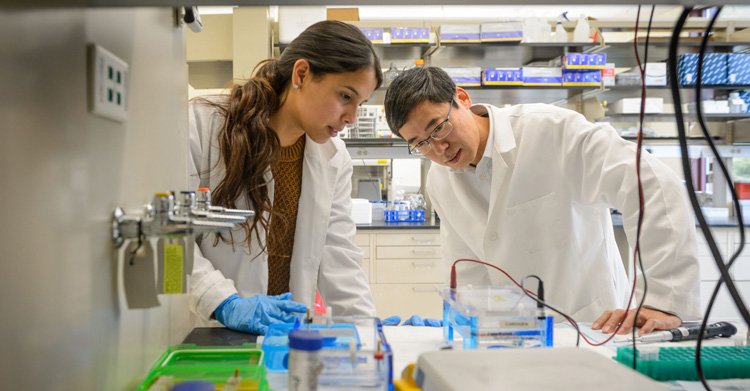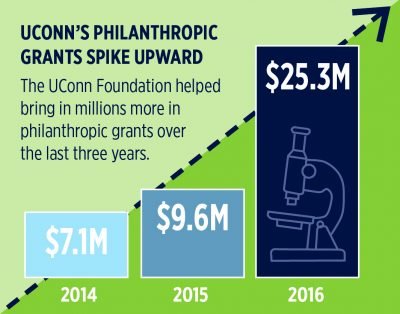From Forest Labs to Rare Diseases

Philanthropic Grants Boost UConn’s Research Partnerships with Industries
By Grace Merritt and Jessica McBride
Deep in the woods behind Horsebarn Hill, UConn has its own forest lab.
There, you’ll see sensors on trees of different species shifting and swaying under ice, snow, wind and torrential rain. It’s all about the biomechanics in a carefully cultivated forest to glean state-of-the-art data on how trees sway and bend with the wind and develop wind-firmness.
Across campus, expert scientists and engineers combine laser technology images from planes to create 3-D computer models of a neighborhood’s trees and phone, cable and power lines. The outcome – a real-life snapshot of tree growth rates that can impact utilities.
A dedicated UConn and Eversource Energy Center team works daily with these and other state-of-the-art tools to improve electric reliability, enhance emergency preparedness during storms, and reduce and shorten outages during storms. Leveraging the expertise of UConn’s faculty, post-doctoral and graduate researchers, and industry partners, the Center is building the electric grid of the future, today, together with federal and state agencies.
Partnering with Leading Businesses
This academia-utility partnership represents an expanding direction for UConn. Industry partnerships like these fund researchers and teach graduate students research skills while leveraging the research capabilities of the state’s flagship public university. Together, they support economic growth in Connecticut and lead to innovative discoveries.
“With our partnership with UConn, our vision for the Eversource Energy Center as a scientific, research, and operational hub is a reality,” said Ken Bowes, Eversource Energy Vice President – Transmission Performance. “The grid of the future will be unlike anything we’ve encountered, with smart homes, smart cities, and an intelligent, interactive, automated grid. Our Center is ready to lead these important conversations, driving the innovations and advances that will create the grid of the future.”
Another sponsored research collaboration focuses on the targeted cellular repair platform work of Catherine Wu, PhD, and George Wu, MD, PhD, Director, Hepatology Section, Division of Gastroenterology-Hepatology at UConn Health have been pioneers in the field of targeted restoration of damaged cells. The husband-and-wife team’s innovative technology is being used in collaborative research to determine if normal cell function can be restored in defective cells that cause rare diseases.
A record-breaking year for philanthropic grants
The $9 million grant from Eversource contributed to a record year in fiscal 2016 for the UConn Foundation’s philanthropic gifts and grants for research, more than doubling its prior record year. The Eversource grant, along with a $5.7 million award from the John Templeton Foundation to study how to balance humility and conviction in public life, and other gifts, funneled $25.3 million from the UConn Foundation into research.
 The Foundation’s fundraising through philanthropic gifts and grants have grown dramatically from $7.1 million in 2014 and $9.6 million in 2015, to $25.3 million in 2016.
The Foundation’s fundraising through philanthropic gifts and grants have grown dramatically from $7.1 million in 2014 and $9.6 million in 2015, to $25.3 million in 2016.
These philanthropic gifts and grants are just a fraction of UConn’s nearly $250 million annual research enterprise, which includes federal grants. But in an era when state and federal research funds are shrinking, these industry partnerships pay for research and much more.
“The partnerships provide valuable research for companies, as well as scholarships and fellowships for the students and faculty doing the research,” said Joshua Newton, president and CEO of the UConn Foundation. “They are helping to build the next generation workforce by training researchers and scientists and often hiring them.”
UConn’s Research & Innovation Pipeline
UConn is committed to supporting existing industries and growing new entrepreneurial ventures. To help foster these partnerships, UConn has hired an executive director of venture development, has launched early-stage funding programs to advance promising technologies, and has taken other steps to help bring UConn’s research and innovation to the community.
The University uses its in-house expertise to transform UConn discoveries into products and services that benefit society. A team of technology commercialization experts in the Office of the Vice President for Research helps faculty and students with patent protection, licensing, business mentorship, startup formation, and connections with industry partners.
The goal of this support is to move life-saving technologies from the lab to the marketplace. One such technology in development is a new drug to treat and cure patients with advanced heart failure. Dr. Bruce Liang, Dean of the School of Medicine and a clinical cardiologist, is developing a treatment that can help patients with advanced heart failure.
“Due to advanced age or coexisting conditions, we can’t try to help these patients with a cardiac transplant or ventricular-assist device,” said Dr. Liang. “I formed Cornovus Pharmaceuticals Inc. in 2011 with UConn’s support to pursue a treatment for this critical unmet need and to give these patients a chance to survive and thrive.”
Cornovus has already secured funding from the SMARTT (Science Moving towards Research Translation and Therapy) program from the National Institutes of Health and has raised an additional $3.5 million for preclinical testing to gain FDA approval for an investigational new drug (IND). At that point, Cornovus would be in a position to carry out first-in-human testing and will need to raise another $20 million to conduct advanced human clinical trials.
“A critical part of UConn’s research mission is to support the development of innovative technologies coming out of University labs that could benefit Connecticut’s citizens and grow the state’s economy,” said UConn Vice President for Research, Jeff Seemann, PhD. “We’ve seen very positive growth in the area of technology commercialization over the last several years, and we’re confident the trend will continue as UConn supports University startups and fosters new and existing relationships with our industry partners,” he said.
New UConn startups and external technology ventures can find the physical space and the business support they need in UConn’s Technology Incubation Program (TIP). Industry leaders can collaborate with faculty through corporate-sponsored research agreements. This has led to innovations in several fields, including: precision medicine, sustainable technology, diagnostics, advanced materials and additive manufacturing, software, polymers and composites, bioinformatics, drug development and delivery, biomedical devices, nanotechnology, and cybersecurity.
Emerging immunotherapy company CaroGen Corp. is located at TIP in Farmington and is currently collaborating with UConn Health researchers to develop a vaccine to treat patients with colon cancer.
CaroGen’s proprietary technology platform is being applied to several diseases, including a specific target studied by UConn Health researchers Kepeng Wang, assistant professor of immunology, and Anthony T. Vella, professor and Boehringer Ingelheim Chair in Immunology.
“We are thrilled to have the opportunity to work so closely with UConn’s internationally-recognized faculty,” said CaroGen CEO Bijan Almassian. “Working with UConn lets us aggressively pursue our vaccine technology for several devastating diseases, like colon cancer, so that we can more quickly reach the market and provide a solution for patients.”
The UConn Technology Incubation Program has already generated:
- 239 ongoing research projects with promise for future innovation
- 129 technologies available for license
- 35 startup companies in the UConn Technology Incubation Program
- About 60 new inventions annually
- About $1 million annually in licensing revenue
- More than 500 U.S. patents based on UConn technologies
To help support these ventures and established industry leaders, the University is building the Innovation Partnership Building at the UConn Tech Park in Storrs, which will provide physical space and state-of-the-art equipment to encourage collaboration between the University and industry. At the same time, UConn is constructing a five-story engineering and science building in Storrs that will house labs for its growing research programs in genomics, biomedical, chemical engineering, and cyber systems.
These innovations also extend to UConn Health in Farmington, Conn. Five years after state lawmakers made a massive investment to grow bioscience sectors in Connecticut, the UConn Health campus has become a thriving hub for bioscience R&D activities. The Bioscience CT initiative has included major renovations to research and hospital facilities and the relocation of The Jackson Laboratory for Genomic Medicine to the UConn Health campus.
